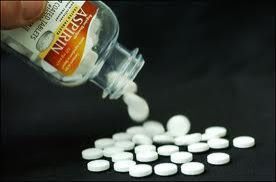Aspirin Before Bed May Lower Chance Of Heart Attack In The Morning

Daily aspirin regimens approved by a doctor can help improve heart health, but health care professionals are still weary concerning what time of the day to take the medication. A study presented at the American Heart Association's Scientific Sessions 2013 revealed that bedtime aspirin can effectively reduce someone’s chance of having a heart attack in the morning.
"Because higher platelet activity contributes to a higher risk of acute heart events, this simple intervention — switching aspirin intake from morning to bedtime — could be beneficial for the millions of patients with heart disease who take aspirin on a daily basis," Tobias Bonten, M.D., Ph.D student at the Leiden University Medical Center in the Netherlands, said in a statement.
According to researchers involved with the study, called Aspirin in Reduction of Tension II, aspirin works by thinning blood so it’s less likely to clot. The activity of blood platelets — the cells that clot — tends to be higher in the morning. Some people who are at a high risk of heart disease are asked to start a daily regimen of low-dose aspirin to interfere with blood clotting in the heart’s arteries.
Dr. Bonten and his colleagues recruited 290 patients for the randomized clinical trial to analyze aspirin intake in patients at risk for cardiovascular disease. Each patient was asked to take 100 mg of aspirin when they woke up, or before they went to sleep, for two, three-month periods. Blood pressure and platelet activity samples were taken after each period concluded. Aspirin taken at bedtime was able to lower platelet activity by 22 units.
Although this study did not prove bedtime aspirin’s beneficial effect on blood pressure, a similar study presented at the American Society of Hypertension’s 2008 annual meeting determined that people who take aspirin daily can control prehypertension. It found that 100 mg of aspirin taken in the morning failed to lower participants' blood pressure, but when taken at night, the same amount of aspirin was effective.
"There is some evidence that taking a variety of medications, including those for hypertension, at night is associated with greater blood pressure reduction than taking them in the morning," president of the American Society for Hypertension, Dr. Suzanne Oparil told HealthDay. "It's all a little bit speculative about why, but I think the observation is solid."



























